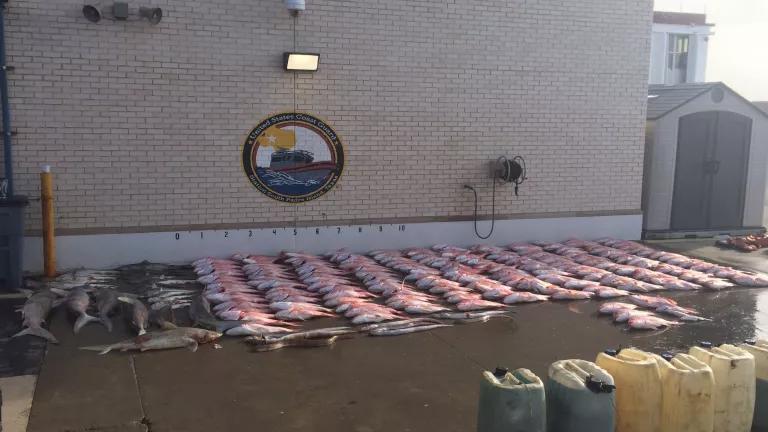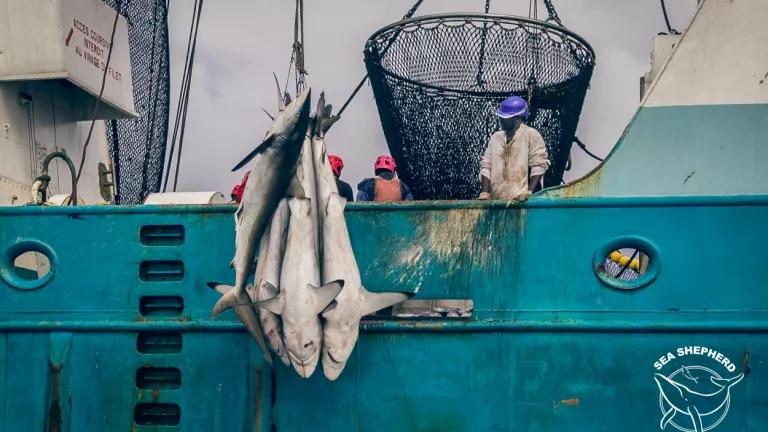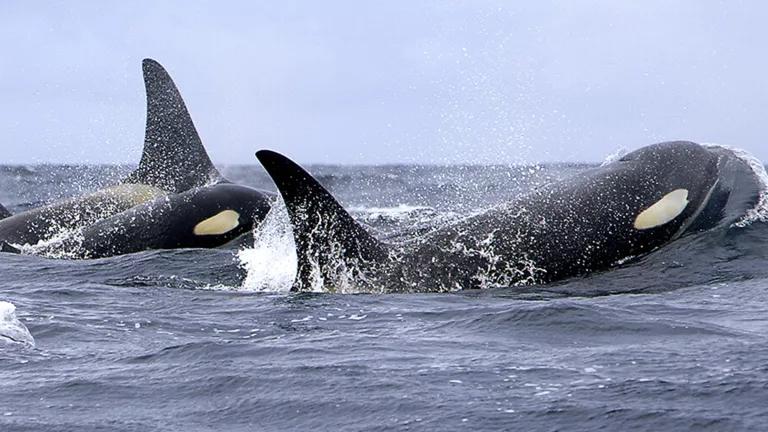
The House Natural Resources Subcommittee on Water, Oceans, and Wildlife held an oversight hearing last week to shed light on the illegal seafood trade and accompanying labor and human rights violations. The hearing provided a good overview of the issues, and also illuminated the need for the National Oceanic and Atmospheric Administration (NOAA) and other government agencies to step up efforts to crack down on illegal, unregulated, and unreported fishing (IUU) and related human rights abuses.
Testimony by Alexa Cole, the acting director of International Affairs and Seafood Inspection at NOAA, opened the hearing on the agency’s 2019 Report to Congress on IUU fishing activity.
A shocking amount of the seafood that ends up on our plates has been illegally caught: some 20 to 32 percent of the wild caught fish imported into the United States is illegally caught, amounting to around $2.1 billion in tainted products entering the country every year. Illegal fishing includes practices like using illegal gear to fish, fishing in protected areas or without the proper authorization, violating conservation and management measures established to protect marine biodiversity and habitats (such as measures to reduce impacts of fishing on marine mammals, sea turtles, seabirds, and sharks), or failing to accurately report catches.
The 2019 IUU Report to Congress is an opportunity for NOAA to use one of the best tools it has in the fight against IUU fishing—the High Seas Driftnet Fishing Moratorium Protection Act (the Act)—to push countries to halt these destructive practices. Yet, consistent with history, NOAA failed to fully leverage its power to stamp out these ills. NOAA’s report identified just three countries—Mexico, Ecuador, and the Republic of Korea—for engaging in illegal fishing in 2016 - 2018. NOAA will work with these countries to address their fishing practices and will only recommend the trade sanctions and other penalties allowed by law if these countries fail to address identified violations. NOAA also flagged China as a country of concern, for evidence of illegal fishing activities in the exclusive economic zones (EEZ) of other countries, but the agency stopped short of officially identifying China under the Act.
Several Committee members—including Representatives Huffman, Radewagen, Sablan, and Case—expressed concern about whether NOAA was exercising the full extent of its authority to identify and penalize bad actors. Among their concerns were: whether NOAA could use trade sanctions more often to spur corrective action in countries engaging in IUU fishing; NOAA’s failures to identify nations for engaging in illegal shark fishing; and whether NOAA should expand the definition of IUU to allow formal identification of nations like China and also allow identification of nations with labor violations in their seafood supply chains.
Sharks are explicitly protected by the Act and it requires the identification of nations whose fishing practices interfere with shark conservation; yet NOAA’s weak implementation of the law falls short of what is needed to drive international change. For example, despite extensive evidence of illegal shark fishing by multiple nations during the years covered by the report, NOAA failed to identify a single nation for shark-related violations.
The hearing included testimony by several expert witnesses—journalist Ian Urbina, Ame Sagiv of Humanity United, Nathaniel Rickard of the Southern Shrimp Alliance, and John Connelly of the National Fisheries Institute—on the intersections between illegal fishing and labor violations. All acknowledged that imported seafood could have been caught or produced with exploited labor, although they differed as to the prevalence of forced labor in the seafood industry.
Committee members’ questions emphasized the importance of tackling environmental and human problems in tandem, ensuring that NOAA and other federal agencies use their full authority to address violations and stop the import of tainted goods, and the importance protecting fishermen who play by the rules.
A Deeper Dive into Labor Issues in the Seafood Supply Chain
One of the oversight hearing panelists was journalist Ian Urbina, who brings eyewitness experience of IUU fishing practices to the debate. I recently attended a talk by Urbina, whose new book Outlaw Ocean is a gripping account of the lawlessness rampant on the high seas, spanning island nations’ fight against illegal fishing, the labor and human rights violations plaguing the fishing industry, the rush to extract mineral resources from the deep oceans, and much more.
Illegal fishing and labor abuses are part of a vicious circle—as fish stocks dwindle and become harder to catch, fishermen must travel further out to sea to find fish, which drives the costs of fishing up, and some fleets resort to exploitative and abusive practices to keep crew on their boats and labor costs down. Urbina’s book and his earlier work at the New York Times highlight some of those stories, including those of fishermen working Thai trawlers, who reported shifts running up to 20 hours a day, being beaten or denied food if they displeased the captain, and working for years to clear the debts used to secure their employment. Some reported being trafficked onto vessels or shackled or kept in cages to prevent them from jumping ship.
But these abuses are not limited to foreign fleets fishing distant waters. Recent reports by the Environmental Justice Foundation and Georgetown University Law Center illuminate similar labor abuses in the Hawaiian longliner fleet. A recently settled case from the Northern District of California, Sorihin v. Nguyen, involved fishermen who escaped when their ship was docked in San Francisco and complained of being forced to work long hours without proper protective equipment, having their passports confiscated and pay withheld, and being denied medical treatment.
At NRDC, we work to fight IUU fishing, by pushing for more transparency in the seafood supply chain, calling for accountability for nations failing to comply with fishing laws, or whose fishing practices result in bycatch of protected resources and sharks, and shedding light on the illegal shark fin trade through the United States.
As Committee members and witnesses highlighted during the House Natural Resources Hearing, the environmental and labor issues associated with imported seafood are thoroughly intertwined. NRDC is working to ensure that the government upholds environmental protections and blocks bad actors from trade, that we protect fish stocks and vulnerable species and also protect the vulnerable workers who put food on our tables.
This blog provides general information, not legal advice. If you need legal help, please consult a lawyer in your state.




